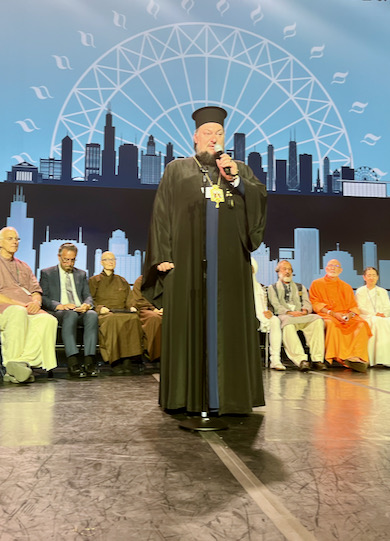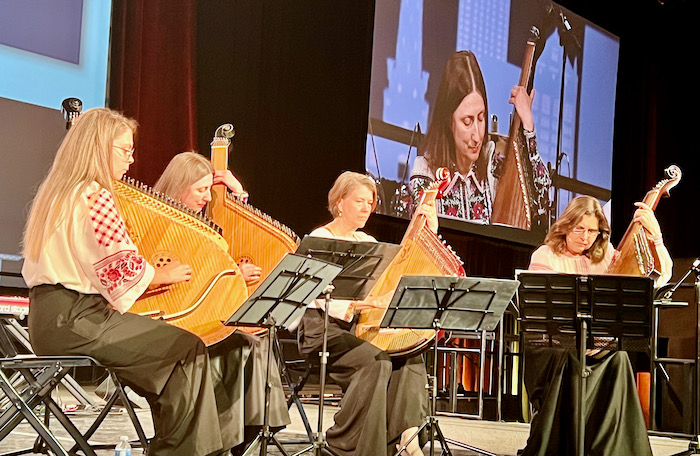This 3-minute YouTube video is a quick visual tour of the 2023 Parliament.
Within the Parliament’s Peaceful Mission Is Spiritual Support for Embattled Ukraine
By JOE GRIMM
MSU School of Journalism founder of Bias Busters book series
CHICAGO—The first Parliament of the World’s Religions, held in Chicago in 1893, was billed as a national dialogue about faith. Now, the event is known as the birth of the worldwide interfaith movement. Its 2023 edition, held Aug. 14-18 in Chicago, sustains that vision in new ways.

Religious leaders flanked Christian Orthodox Archbishop Germanos of Chernivtsi, a city in southwestern Ukraine, to show the global spiritual support that has flowed through the interfaith parliament since its founding more than a century ago. Photos with these stories from the 2023 Parliament are by Joe Grimm and used with his permission.
One innovation this year: Before hundreds of people near the parliament’s conclusion, representatives from Judaism, Christianity, Islam, Hinduism, Buddhism and Sikhism rallied behind Ukraine.
Sharing the stage with Christian Orthodox Archbishop Germanos of Chernivtsi, a city in southwestern Ukraine, the religious leaders pledged solidarity and support.
Symbolically, this last-day event showed how the interfaith message has survived 130 years, as well as how it has changed and faces new challenges. In 1893, Sikhs were not included in the parliament. This year, Sikhs were at center stage, supporting Ukraine. Another group absent the first time out, the Church of Jesus Christ of Latter-day Saints, had a large presence in the parliament’s marketplace.
Weaving prepared statements, music, poetry and prayer, religious leaders and performers comprised blanket support for Ukraine. The war, however, is threatening to tear apart Germanos’ Eastern Orthodox Church. With major Orthodox capitals in Moscow and Kiev, the church has been weaponized by both sides in this conflict.
Russian Orthodox Church leader Patriarch Kirill has said, “Any war must have guns and ideas. In this war, the Kremlin has provided the guns, and I believe the Russian Orthodox Church is providing the ideas.” A Russian strike in July badly damaged Ukraine’s landmark Transfiguration Cathedral.
On the other side of the conflict, the Ukrainian government has ordered 1,000 Orthodox monks suspected of being loyal to Russia out of their state-owned monastery in the capital of Kiev. And, to further distance itself from Moscow, Ukraine recently changed its official date for Orthodox Christmas from the Russian date of Jan. 7 to the western date of Dec. 25.
In his brief, warm response to the parliament’s expressions of solidarity, the archbishop thanked world religions for the friendship that he said he hopes leads to unity. He also acknowledged the Ukrainian diaspora which has brought his country’s people to Chicago.

The Chicago Bandura Ensemble, built around Ukrainian instruments, gives musical testimony to the diaspora that meant the Ukrainian archbishop found familiar strains far from home.
Music for this special program was provided by the Chicago Bandura Ensemble.
The bandura is a Ukrainian instrument with as many as 65 strings. It is tuned like a piano and plays like a cross between a guitar and a harp.
On the day after Germanos acknowledged support, a Russian missile attack on the northern Ukrainian city of Chernihiv struck a central square, a university and a theater. At least seven were killed and almost 130 injured.
CNN reported that Ukraine’s minister of internal affairs, said the strike occurred as people were leaving church with “baskets of blessed apples.” The day is a major holiday on the Orthodox calendar, as apples and honey were being consecrated for The Feast of the Transfiguration of Jesus.
A surprising ending for the Ukrainian event spoke to the interfaith nature of the parliament. A shofar ram’s horn was blown, recognizing that the Jewish holiday of Rosh Hashana is coming soon.
.
Care to Learn More?
Joe Grimm, the founder of the Michigan State University School of Journalism Bias Busters project, attended the 2023 Parliament and has provided us two stories and colorful photos as well. In addition to this story, he also sent us:
A REPORT HIGHLIGHTING one of the most important religious groups participating in the Parliament is this second story: Sikhs show the world their spiritual commitment to service at the 2023 Parliament of the World’s Religions.
Joe Grimm is nationally known for his tireless commitment to diversity through journalism, both in the training and hiring of journalists and in the kinds of stories covered by newspapers, magazines, TV, radio and online publications. When asked to describe the Bias Busters project that Joe founded through the Michigan State University School of Journalism, he writes:
This series springs from the idea that good journalism should increase cross-cultural competence and understanding. Most of our guides are created by Michigan State University journalism students. We use journalistic interviews to surface the simple, everyday questions that people have about each other but might be afraid to ask. We use research and reporting to get the answers and then put them where people can find them, read them and learn about each other.
These cultural competence guides are meant to be conversation starters. We want people to use these guides to get some base-line understanding and to feel more comfortable asking more questions. We put a guide to resources in every guide we make, we arrange community conversations and we are working on a facilitation guide. While the guides can answer questions in private, they are meant to spark discussions.

